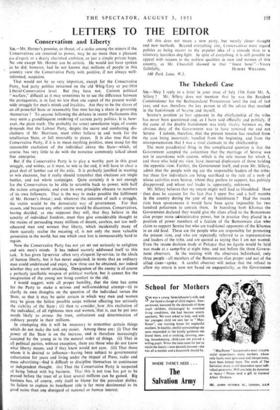LETTER ' S TO
THE EDITOR
Conservatism and Liberty
SIR, Mr. Homer's promise, or threat, of a strike among the miners if the Conservatives are returned to power, may be no more than a pleasant jeu d'esprit, or a dearly cherished ambition, or just a simple private hope. No one except Mr. Horner can be certain. He would not have spoken as he did, however, had he not known that millions of people in this country view the Conservative Party with positive, if not always well- informed, suspicion.
That would not be so very important, except for the Conservative Party, had party politics remained on the old Whig-Tory or pre-1914 Liberal-Conservative level. But they have not. Current political " warfare," difficult as it may sometimes be to see the difference between the protagonists, is in fact no less than one aspect of the present world- wide struggle for men's minds and loyalties. Are they to be the slaves of an all-powerful State or reasonably free men having a share in governing themselves ? To anyone following the debates in recent Parliaments this may seem a grandiloquent rendering of current party politics. It is, how- ever, the plain truth. The probably (to some) unwelcome logic of events demands that the Labour Party, despite the suave and comforting dis- claimers of Mr. Morrison, must either believe in and work for the totalitarian State, or.-fall miserably to pieces. It is also true that the Conservative Party, if it is to mean anything positive, must stand for the reasonable exaltation of the individual above the State—which, of course, has very little to do with the nonsense commonly talked about free enterprise.
But, if the Conservative Party is to play a worthy part in this great struggle, and wishes, as it must, to win in the end, it will have to clear a great deal of lumber out of the attic. It is perfectly justified in wanting to win elections, but it really should remember that elections are single battles, and not whole campaigns. Quite certainly it is not enough for the Conservatives to be able to scramble back to power; with half the nation antagonistic, and even its own principles obscure to numbers of its own followers. That is the way to make possible the fulfilment of Mr. Horner's threat ; and, whatever the outcome of such a struggle, the victim would be the democratic way of government. For that reason, and because any other course would be disastrous, Conservatives, having decided, as one supposeS they will, that they believe in the sanctity of individual freedom, must then give considerable thought to the means of persuading many millions of decent,. careless, not too well- educated men and women that liberty, which incidentally many of them scarcely realise the meaning of, is not only the most valuable possession in the world, but one which once lost is immeasurably hard to regain.
Now the Conservative Party has not yet set out seriously to enlighten and win men's-- minds. It has indeed scarcely addressed itself to this task. It has given lip-service often very eloquent lip-service:to the ideals of human liberty,• but it has never explained, in terms that an ordinary man could understand and enjoy, how these can be obtained, nor indeed whether they are worth attaining. Denigration of the enemy is of course a perfectly justifiable weapon of political warfare; but it cannot fire the imagination of the young nor bring comfort to the old. I would suggest, with all proper humility, that the time has come fin- the Party to make a serious and well considered attempt—(i) to clarify its own, thoughts on the question of the individual versus the State, so that it may be quite certain in which way men and women may be 'given the fullest possible scope without affecting too seriously the viability of the State ; (ii) then to consider, how this exaltation of the individual, of all righteous men and women, that is, can be put into words likely to . arouse the trust, enthusiasm and determination of ordinary people in their millions.
In attefnpting this it will be necessary to remember certain things which do not make the task any easier. Among these are: (i) That the power of the State is on the increase, and is therefore increasingly accepted by the young as in the natural order of things. (ii) That in all political parties, without exception, there are those who do not know what liberty means, and if they knew would not care. (iii),That those whom it is desired to influence—having been subject to governmental exhortation for years and living under the impact of Press, radio and mass advertising—find it difficult to discipline themselves to continuous or independent thought. (iv) That the Conservative Party is suspected of being linked with big business. That this is not true has got to be proved before the trust of at least several millions can be gained. Big business has, of course, only itself to blame for the prevalent dislike. Its failure to explain its beneficent role is far more detrimental to its good naive -than arty disregard of national or human interest: All this does not mean a new party, but merely closer thought and new methods. Beyond everything else, Conservatives must regard politics as being nearer to the popular idea of a crusade than to a relatively harmless dog-fight. In spite of everything, it is still possible to appeal with success to the noblest qualities in men and women of this country, as Mr. Churchill showed in that " finest hour."—Yours






























 Previous page
Previous page